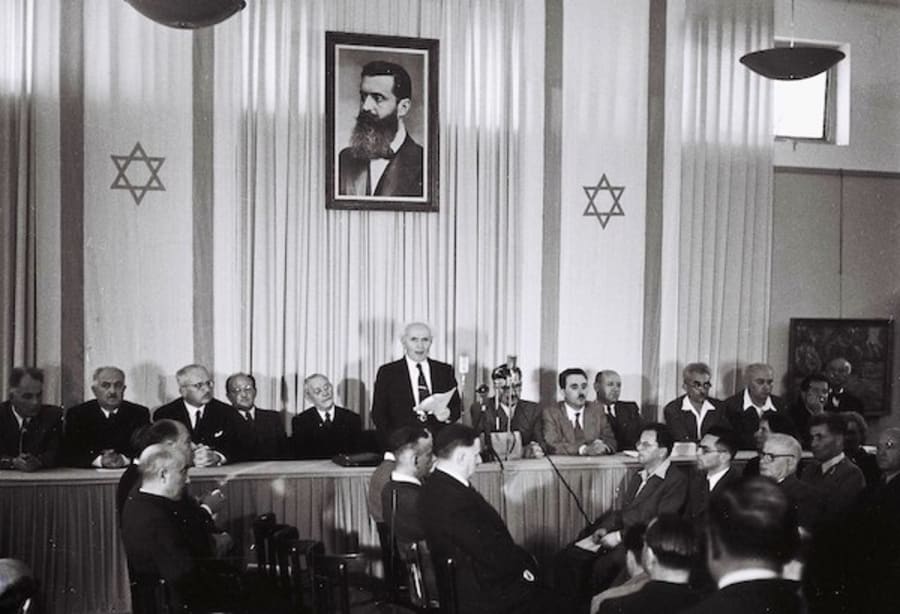The story behind the prophetic establishment of the nation of Israel, Part 1 of 3

But I said to you, "You will possess their land; I will give it to you as an inheritance, a land flowing with milk and honey." I am the Lord your God, who has set you apart from the nations.” (Leviticus 20:24)
Most would agree that the modern establishment of Israel was a prophetic fulfillment. Yet 75 years since that time, many have forgotten some amazing details of that intense era. Perhaps those details can give us hope for today.
In a broad sense, biblical prophecy is simply God letting us know His plan ahead of time. Often in the scriptures, the hearers didn’t realize this fact until they were in the moment that was foretold.
The same could be said of the modern establishment of Israel in 1948. While the verse above in Leviticus was originally spoken to prepare Israel to enter the promised land the first time, history shows us that this same verse came back to life again in the tumultuous spring of 1948.
On Friday afternoon, May 14, 1948 (5 Iyar 5708), a secret meeting was hastily called at the Tel Aviv Museum with a few hundred invitations quietly distributed. The British mandate in Palestine was ending the next day and the British army was leaving, undoubtedly knowing that a full-scale war was inevitable.
Five well-trained, well-equipped Arab armies were prepared to invade, outnumbering the local Jewish inhabitants 4 to 1, outgunning them 8 to 1 with total Jewish ammunition expected to run out in 3 to 4 days. Yet, with the odds clearly against them, plans of a formal declaration of independence for the Jewish state heedlessly went forward.
Even then, very little seemed formal. The ceremony was secretly thrown together with 24-hour notice, as there were tangible fears that the Arabs might attack sooner than expected or the British might try and stop the declaration. Only a couple of days before, the new state’s name of “Israel” had been agreed upon.
Arguments continued about what exactly would be in the declaration, up until an hour before the ceremony. Even then, David Ben Gurion, who would become Israel’s first prime minister, read the declaration from his own hand-scribbled notes, as the original scroll was not yet completed. Furthermore, at this ceremony, the signers of the Declaration of Independence signed a blank scroll that was later attached to the original final document. It was not the preparation one would expect for establishing a new state.
At 4 p.m. the ceremony began as David Ben Gurion banged his gavel on the table and the spontaneous singing of Hatikvah was sung, which would soon become Israel’s national anthem. Since Shabbat was just hours away at sundown, this would be a short ceremony and broadcast live to all who were in range on the new national radio station, Kol Israel.
After the singing, Ben Gurion read the declaration from his notes and invited guests to stand by saying, “Let us accept the foundation scroll of the Jewish state by rising.” Rabbi Yehuda Lieb Fishman was asked to recite the ancient Shehecheyanu blessing, as found in the Talmud, that expresses thanks to God for new things or when you do something exciting for the first time. He did so while trembling and choking back tears, fully aware of this significant moment they were in. With that blessing, the ceremony was adjourned. In only 32 minutes, the modern state of Israel was born for the first time in 2,000 years, just as the prophets foretold and under the leadership of mostly secular men.
As the Sabbath set in that evening, Jewish celebrations began around the new Jewish nation and around the world. As part of every Friday evening Shabbat, there are traditionally scheduled readings from the Torah (the five books of Moses) and the haftarah (selections from the Prophets). It is traditionally believed that Ezra the prophet established these readings as a way to keep the Babylonian exiles united as they returned to the land. These readings have continued to this day.
The scheduled readings on that Friday night, erev Shabbat, after the Declaration of Independence were called “Kedoshim,” which means “holy” and encourages “holiness” in the land that God is bringing them into. In this portion, we read these words:
But I said to you, "You will possess their land; I will give it to you as an inheritance, a land flowing with milk and honey." I am the Lord your God, who has set you apart from the nations.” (Leviticus 20:24)
What a promise! Regardless of the chaotic times and seemingly insurmountable odds, this Torah promise was firm and soon came to pass. Yet, that wasn’t all. Wait until you read what was found in the haftarah portion for this week, just hours after Israel’s declaration of independence. Join me for Part 2!

Doug Hershey is the author of the best selling photo books "Israel Rising" and "Jerusalem Rising" that provide historical and visual documentation of biblical prophecy coming to pass in our day. When not in Israel, he resides in Portland, Maine. Check out more information on courses, event requests and Israel tours on his website DougHershey.co














